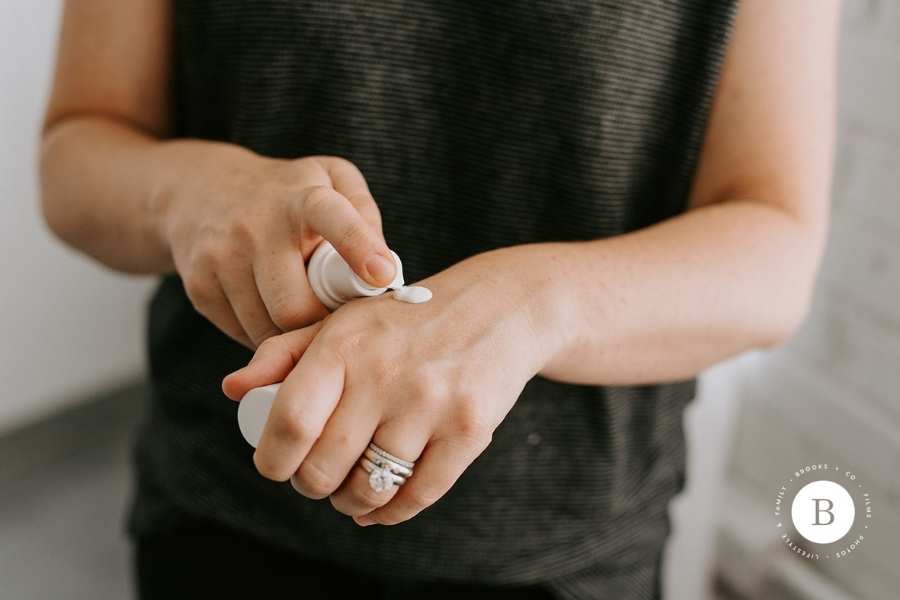I recently bought some blue light blocking glasses on Amazon in an attempt to prevent my late-night screen time from impairing my sleep. Sleep is everything when it comes to health, beauty, and just feeling good. Something made me start looking into what blue light is and what it might do to our bodies. It turns out that blue light doesn’t just affect sleep but might be aging our skin. I’m not here to scare you into throwing away your cell phone or investing in a ton of skincare products. But, I think it’s important to understand the potential for blue light skin damage and how to protect your skin from blue light. Keep reading, and I’ll explain what we know so far about blue light and how it may prematurely age our skin.
What is Blue Light?
Blut light is a color in the visible light spectrum that we see with our eyes. Each color has a different energy and wavelength, and blue light is a short wavelength, High Energy Visible (HEV) light.
The primary source of blue light is the sun’s rays. Today, artificial blue light is everywhere, including LED lights, CFL bulbs, fluorescent lights, computers, smartphones, televisions, and tablet screens.
Blue light won’t visibly burn your skin, and blue light exposure doesn’t cause skin cancer like UV rays. The main concern with blue light skin is its ability to penetrate the skin more deeply and cause premature aging.
Potential Risk of Increased Blue Light Exposure
Blue light skin exposure causes increases in melanin production, leading to skin discoloration. This discoloration is more common in people of color, those that struggle with hyperpigmentation, and people with existing melasma.
Blue light creates reactive oxygen species (ROS), or free radicals, causing oxidative damage in the skin. This process results in weakened collagen and elastin. In other words, premature aging, fine line, and wrinkles.
Lastly, blue light can affect the skin’s circadian rhythm and regeneration cycles. Did you know the skin cells can act independently of the brain? During the day, the skin focuses on protecting itself, while during the night, it works on cell regeneration. There is evidence that skin cells can sense blue light and perceive it as day. A lack of light indicates to the cells that it is night. So, too much blue light at night could deprive your skin of regeneration time.
Is Blue Light Skin Damage a Legitimate Concern?

Photo by Brooks + Co https://www.bybrooksandco.com/
Research on how blue light affects the skin is ongoing. But, dermatologists do have concerns about premature aging and blue light skin damage based on what we know so far. Here are the early studies on blue light skin damage commonly referenced today.
- In this 2010 study, researchers exposed skin to the same amounts of blue light we get from the sun. They saw more pigment, redness, and swelling than that from exposure to comparable levels of UVA rays.
- We know that blue light affects our skin’s circadian rhythm based on this study. There were alterations in the skin’s regenerative cycle.
- This study in 2015 proposes that blue light exposure results in free radical production in the skin, which can accelerate aging.
It’s proposed that 8 hours of blue light exposure from devices is equivalent to 20 minutes of blue light exposure from the sun. Unlike the sun, we hold artificial sources of blue light close to the face and body. But, studies are lacking as to how the blue light from our devices affects our skin.
Some dermatologists have shared anecdotal reports of what they think is blue light skin damage
- A new pattern of hyperpigmentation that may be from holding a cell phone near the face.
- Dark spots after acne that are worse on the side the person has their cellphone.
- Melasma on the side of the face (where a cell phone casts blue light) instead of the cheeks, where it was previously more common.
The bottom line is the blue light effect on skin needs more research. We don’t yet know if we get enough blue light from our screens to be concerned. My thought is, why risk it? We know it’s nearly impossible to avoid blue light in our lives, so why not protect our skin from blue light damage just in case? I know I’d prefer to be protected.
How to Protect Skin from Blue Light

Photo by Brooks + Co https://www.bybrooksandco.com/
At this point, the best strategy against blue light skin damage is likely the same as preventing and repairing sun damage:
Limit Exposure to Blue Light
- Use a blue light filter or night mode on your phone and laptop or tablet.
- Reduce your total screentime if possible. I’m sure this will help your relationships and happiness too!
- Go hands-free from your phone using blue tooth headphones. Airpods were a game-changer for me in terms of convenience. But, I’m also happy not to have my cellphone touching my dace, exposing it to blue light and bacteria.
Blue Light Blocking Sunscreen
To protect from blue light, you’ll want to choose a mineral sunscreen that uses iron oxide, commonly zinc oxide or titanium dioxide. Mineral sunscreens, aka physical sunscreens, prevent the UV rays from penetrating the skin and causing damage. Chemical sunscreens don’t have the same blue light blocking benefits as iron-oxide based mineral sunscreens.
Keep in mind that the FDA doesn’t regulate blue light protection in sunscreens. There are no guidelines for blue light protection claims made by a particular product or standard for ingredients that claim protection from blue light. Just because a product claims to block blue light doesn’t mean it’s any more effective than another mineral sunscreen. It might be; we don’t know enough about this yet.
Antioxidants, Other Ingredients for Blue Light Skin Damage
Another strategy is to use an antioxidant in your skincare regimen to neutralize the free radicals before they do any skin damage. Here are a few of the extra ingredients you’ll see in blue light skin damage preventing products.
- Vitamin C
- Licochalcone A
- Lutein
- Hyaluronic Acid
- Red Algae Extract
My Favorite Blue Light Blocking Sunscreen
Many dermatologists agree that the most effective protection against HEV is a combination of both potent antioxidants topped with a traditional sunscreen. Currently, I’m using Monat Sun Veil. It’s a non-nano zinc oxide sunscreen that blends well. It also contains Hyaluronic acid, Arnica, and Red Algae Extract as its antioxidant/extra blue light protection. It provides broad-spectrum UVA and UVB coverage. I also appreciate the price point and it doesn’t make my skin greasy or oily. It’s I hardly know I have it on. It’s also reef safe, leaping bunny certified, gluten-free, vegan, and approved for daily use by the skin cancer foundation.

Photo by Brooks + Co https://www.bybrooksandco.com/
Is blue light skin damage a concern to you? Do you wear a sunscreen that offers blue light protection? Feel free to reach out if you have questions on this topic, or you’d like more info on Monat Sun Viel. I’m just so happy with it and everyone who samples it loves it too.









